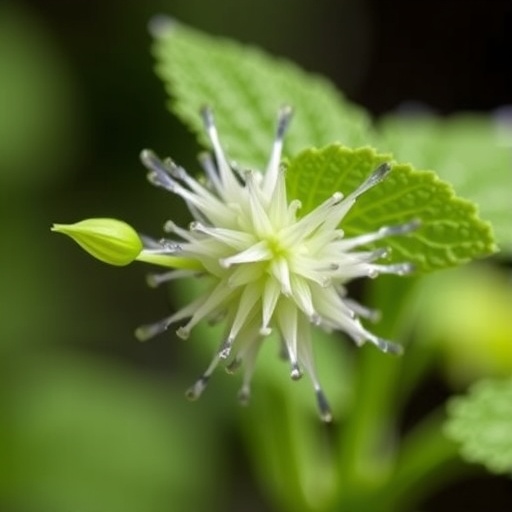In a remarkable advancement within aquaculture and nutritional science, researchers have unveiled the potential of trypsin-encapsulated nanoparticles to substantially enhance the growth performance of Labeo rohita fingerlings when fed plant-based diets. The implications of this study, conducted by a team of dedicated scientists, pave the way for more sustainable fish farming practices while addressing concerns around the reliance on animal-based protein sources. The study highlights an innovative approach that integrates biotechnology with conventional aquaculture, promising to elevate the efficiency of fish growth and overall health.
The motivation behind this groundbreaking research is rooted in the necessity for sustainable aquaculture methods. As global fish consumption continues to rise, the pressures on marine resources intensify. Traditional fish feeds often rely heavily on fishmeal and fish oil, leading to overfishing and environmental degradation. By harnessing the benefits of plant-based diets augmented with bioactive compounds, researchers aim to not only improve growth performance but also promote environmental sustainability. The encapsulation of trypsin within nanoparticles serves as a strategic solution, offering improved bioavailability and effectiveness.
The methodology employed in this study is both innovative and intricate. The researchers meticulously designed a protocol for synthesizing trypsin-encapsulated nanoparticles that would effectively deliver the enzyme to the Labeo rohita fingerlings. By employing techniques such as nanoprecipitation, the team was able to create nanoparticles that exhibit enhanced stability and controlled release properties. These methodologies are crucial for optimizing the bioactivity of the encapsulated trypsin, ensuring that it remains active in the digestive tract of the fish, thereby facilitating optimal nutrient absorption.
Upon conducting feeding trials, the results revealed significant improvements in growth rates among the fingerlings that were fed diets supplemented with trypsin-encapsulated nanoparticles. The fish exhibited enhanced feed conversion ratios and improved weight gain compared to those fed conventional plant-based diets without the added enzyme. This finding is particularly significant, as it suggests that the bioactive nanoparticles not only support better nutrient uptake but also contribute to healthier growth in aquatic species.
Furthermore, the study delves into the biochemical mechanisms underlying these observed benefits. The researchers discovered that the presence of trypsin plays a crucial role in enhancing protein digestion and absorption in Labeo rohita. The enzyme aids in breaking down complex proteins into smaller peptides, which can be readily absorbed by the fish’s digestive system. This bioconversion process is vital, especially when considering the protein digestibility of plant-based feed ingredients that often contain anti-nutritional factors.
The implications of these findings extend beyond just enhanced growth in Labeo rohita. With the increasing demand for plant-based aquaculture strategies, this research opens avenues for further studies into other fish species that may benefit from similar dietary enhancements. As the aquaculture industry faces the challenge of meeting global food security goals, the ability to leverage biotechnological innovations like trypsin-encapsulated nanoparticles could revolutionize the sector.
It’s noteworthy to mention how the integration of advanced technologies, such as nanotechnology and enzyme therapy, shapes the future of fish farming. This research exemplifies a paradigm shift in our approach to aquaculture, moving towards more sustainable feeds that maximize nutritional efficacy. The potential for incorporating such innovations could lessen the environmental footprint of fish farming, aligning with global sustainability goals and ensuring the health of aquatic ecosystems.
Moreover, the challenges inherent in transitioning to these new methodologies should not be overlooked. As with any innovative approach, regulatory hurdles, consumer acceptance, and market readiness are critical factors that stakeholders will need to consider. Ensuring that these novel feed formulations are safe, effective, and acceptable to consumers will be essential for the widespread adoption of this technology within the aquaculture industry.
Beyond these scientific and practical implications, the study also emphasizes the importance of continued research and collaboration in this field. The multifaceted nature of aquaculture calls for interdisciplinary approaches that engage researchers, aquaculturists, and policymakers. Together, they can create an ecosystem conducive to innovation and progress, ultimately promoting food security and sustainable practices in global fish farming.
As this research gains attention, it undoubtedly sets the stage for future studies aimed at optimizing aquafeeds and exploring the factors that contribute to successful fish farming. By understanding the dynamics of enzyme supplementation, researchers can further refine and adapt their strategies to meet the specific needs of various fish species, thereby enhancing both productivity and sustainability.
In conclusion, the introduction of trypsin-encapsulated nanoparticles represents a significant leap forward in aquaculture nutrition. With its potential to improve growth performance in Labeo rohita fingerlings fed plant-based diets, this research holds promise for addressing critical sustainability challenges facing the aquaculture industry. As we look to the future, the integration of science, technology, and sustainable practices will undoubtedly continue to shape the landscape of responsible aquaculture.
Subject of Research: Enhancing growth performance in Labeo rohita fingerlings using trypsin-encapsulated nanoparticles in plant-based diets.
Article Title: Trypsin encapsulated nanoparticle to improve growth performance in Labeo rohita (Hamilton) fingerling fed plant-based diets.
Article References:
Pde, D.u.r., Nuzaiba, P.M., Gupta, S. et al. Trypsin encapsulated nanoparticle to improve growth performance in Labeo rohita (Hamilton) fingerling fed plant-based diets.
Discov Anim 2, 67 (2025). https://doi.org/10.1007/s44338-025-00120-8
Image Credits: AI Generated
DOI: 10.1007/s44338-025-00120-8
Keywords: Aquaculture, Labeo rohita, trypsin, nanoparticles, plant-based diets, fish growth, sustainability.
Tags: aquaculture biotechnology advancementsbioactive compounds in aquacultureenvironmental sustainability in aquacultureenzyme delivery systems for fishimproving fish health and efficiencyinnovative fish feed solutionsLabeo rohita growth enhancementnanoparticle synthesis for aquaculture applicationsplant-based diets for fishreducing reliance on fishmealsustainable fish farming practicestrypsin nanoparticles in aquaculture





